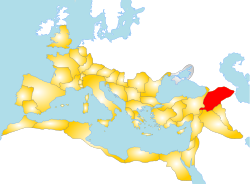Roman Armenia
|
Provincia Armenia Հռոմեական Հայաստան |
|||||
| Province of the Roman Empire | |||||
|
|||||
| Capital | Artashat | ||||
| Historical era | Classical antiquity | ||||
| • | Established | 114 | |||
| • | Disestablished | 118 | |||
| Today part of |
|
||||
Roman Armenia refers to the rule of parts of Greater Armenia by the Roman Empire, from the 1st century AD to the end of Late Antiquity. While Armenia Minor had become a client state and incorporated into the Roman Empire proper during the 1st century AD, Greater Armenia remained an independent kingdom under the Arsacid dynasty. Throughout this period, Armenia remained a bone of contention between Rome and the Parthian Empire, as well as the Sasanian Empire that succeeded the latter, and the casus belli for several of the Roman–Persian Wars. Only in 114–118 was Emperor Trajan able to conquer and incorporate it as a short-lived province.
In the late 4th century, Armenia was divided between Rome and the Sasanians, who took control of the larger part of the Armenian Kingdom and in the mid-5th century abolished the Armenian monarchy. In the 6th and 7th centuries, Armenia once again became a battleground between the East Romans (Byzantines) and the Sasanians, until both powers were defeated and replaced by the Muslim Caliphate in the mid-7th century.
Following the fall of the Artaxiad Dynasty after Pompey's campaign in Armenia in 66 BC, the Kingdom of Armenia was often contested between the Roman Empire and the Parthian Empire during the Roman–Parthian Wars. Throughout most of its history during this period, under the reign of the Arsacid Dynasty, the Armenian nobility was divided among Roman-loyalists, Parthian-loyalists or neutrals.
...
Wikipedia

